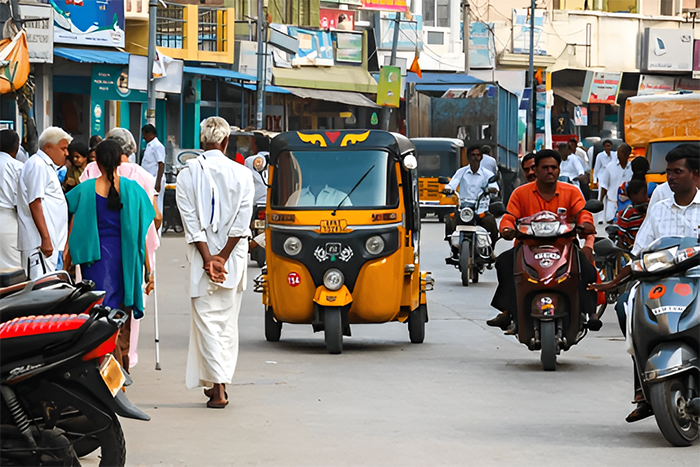Improving Urban Air Quality through Clean Air Zones in Andhra Pradesh

The Energy and Resources Institute (TERI), in partnership with the Andhra Pradesh Pollution Control Board (APPCB), Greater Visakhapatnam Municipal Corporation (GVMC), Vijayawada Municipal Corporation (VMC), and other local stakeholders, is implementing an initiative to plan and develop Clean Air Zones (CAZs) in Visakhapatnam and Vijayawada under the National Clean Air Programme (NCAP).
These cities are among the thirteen non-attainment cities in Andhra Pradesh, where air quality does not meet national standards. Traffic emissions are a major contributor to air pollution in both Visakhapatnam and Vijayawada, posing significant health risks to residents. Through this project, TERI is working closely with city authorities to identify traffic pollution hotspots, design evidence-based interventions, and pilot measures to reduce emissions in selected CAZs.
The approach combines scientific assessments, stakeholder engagement, and targeted action to reduce local exposure to traffic-related air pollution. The strategies developed here will serve as a replicable framework for other Indian cities facing similar challenges, enabling the scaling up of effective air quality interventions nationwide.
Key partners, including the APPCB, Transport Department, Municipal Corporations, and Traffic Police, are collaborating to ensure that CAZs are effectively implemented, sustained, and integrated into broader clean air action plans. This coordinated effort is paving the way for cleaner, healthier, and more liveable urban environments in Andhra Pradesh and beyond
Project Objectives
- Identify transport-related air pollution hotspots using ground-based and satellite data
- Conduct traffic and parking surveys to assess vehicle movement, fleet composition, and congestion
- Assess ambient air quality trends and emission scenarios
- Design context-specific, stakeholder-informed interventions for selected areas
- Develop a pilot implementation roadmap that can be scaled and replicated across other cities
Proposed CAZ Corridors
The project has identified two pilot zones for Clean Air Zone implementation planning:
- Vijayawada: A 1.82 km corridor covering Ramesh Hospital Junction, Siddhartha College, and Polyclinic Road—an area with dense institutional and traffic activity.
- Visakhapatnam: A 1.62 km stretch from Jagadamba Junction to King George Hospital, marked by high traffic volumes and sensitive land uses.
Expected Output
The project will deliver a comprehensive Clean Air Zone (CAZ) framework for Visakhapatnam and Vijayawada, supported by robust scientific evidence and actionable strategies. Key outputs include:
- City-specific Air Quality Baseline Reports detailing PM2.5, PM10, NO2, and SO₂ concentration trends from ground-based and satellite data.
- Source Apportionment Insights summarising dominant emission sources, industrial and localized traffic hotspots for Visakhapatnam, and transport-driven PM2.5 growth for Vijayawada.
- High-Resolution Hotspot Maps identifying priority corridors and zones based on emission intensity, traffic density, and dispersion patterns.
- Traffic and Parking Diagnostic Reports capturing vehicle fleet characteristics, congestion patterns, and parking pressures, serving as a foundation for targeted interventions.
- Integrated CAZ Action Plans for each city, co-developed with local authorities, outlining:
- Vehicular access restrictions aligned with emission norms
- Infrastructure upgrades for walking and cycling
- Zoning for roadside vendors to reduce bottlenecks
- Smart parking management strategies
- Urban greening measures, including Miyawaki forests and vertical gardens
Replicable Methodology Toolkit enabling other non-attainment cities to adopt similar data-driven planning for traffic emission reduction.
